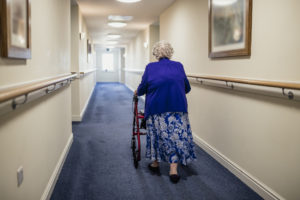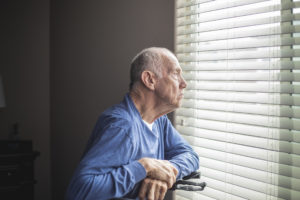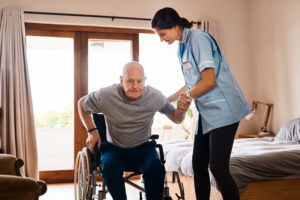Millions of elders living in nursing homes are victims of abuse every year and are not even aware of it. Elder abuse in nursing homes can be difficult to detect and it is not uncommon for cases to go unreported.
Though many elderly residents in nursing homes are treated well and cared for in the manner in which they should be, abuse still continues and is much more prevalent that people wish to believe. Nursing home abuse is something that should definitely be of concern; seniors who have been abused have a 300% greater chance of death in the 3 years following the abuse than those who are not abused. Statistics show that nearly 1 in 6 nursing home residents are the victims of abuse or neglect every year, and although legislatures in all 50 states have passed anti-elder-abuse laws, nursing home abuse continues to occur.
Nursing home abuse can include any of the following:
Physical abuse – may be intentional such as hitting or pinching, or it may be due to neglect including overuse of restraints and lack of physical care
Psychological abuse – this may be harder to identify, but it includes yelling, criticizing, humiliating or shaming of the patient.
Sexual abuse – any unwanted sexual attention or exploitation
Financial exploitation – may include taking advantage of access to patient’s financial matters, stealing, or otherwise compromising a patient’s financial status.
Neglect – often times may be unintentional and a result of inadequate staffing, but nevertheless it is considered to be abusive. Instances of neglect may include, personal hygiene care not being met, not provided with food, clothing, or water.
Signs of nursing home abuse may include the following:
- Broken bones or fractures
- Bruising, cuts or welts
- Changes in mental status
- Poor physical appearance or cleanliness
- Reclusiveness
- Signs of dehydration
- Bed sores
- Frequent infections
- Weight loss
To learn more about nursing home abuse, click here.
What to Do if You Suspect Nursing Home or Caregiver Abuse
Placing your loved one in the care of a nursing home or caregiver is a difficult decision. It’s hard to trust a facility or service with the safe care of your loved one.
One concern when using a nursing home or caregiver is abuse.
How do you know if your loved one is suffering from abuse or neglect? What can you do about it?
Keep reading to learn what to do if you suspect nursing home or caregiver abuse.
Identify the Abuse
Senior citizen abuse happens in many ways. Not all of them are physical.
Look for these signs your loved one is being neglected:
- Sudden weight loss
- Bruises or other injuries
- Refusing help from specific caregivers
- Not talking
- Isolation
- Missing personal belongings
These are signs of suspected elder abuse. Address them immediately with your loved one and the facility staff.
Stay Calm
Unfortunately, elder neglect is a serious problem. Reports say 1 in 60 elder Americans age 60 or older experience a form of abuse.
Emotions can run high if you think your loved one is being abused. But it’s important to stay calm when gathering information and pursuing options to resolve the situation.
It is critical to your loved one’s safety to stay calm. Talk with them and try finding out what’s wrong.
Approach administrative staff with your concerns. Be respectful. Take notes during conversations and keep written communication.
Work toward a resolution in a calm way.
Report The Abuse
If talking with administrative staff doesn’t resolve the situation, you can report elder abuse.
Officials are dedicated to managing the level of elder care in your State. Call the National Center on Elder Abuse at 1-800-677-1116 to find the office for your loved one’s nursing care facility.
If your loved one is in immediate or serious danger, call 911 first. Have them removed from the location right away and put into medical care.
Relocate Your Loved One
Finding the right facility or caregiver for your loved one is difficult. You hope their current location is a good long-term solution.
But when abuse takes place, it’s important to move your loved one out of the situation.
Find a temporary location or move them to a new location.
Let the new facility know of your past concerns. Your loved one might experience lasting effects of abuse or emotional trauma while they adjust to new staff and a new home.
Be patient with a new staff and facility, but continue to stay involved and aware of your loved one’s care.
Consult a Lawyer For Suspected Caregiver Abuse
Identifying caregiver abuse can be difficult. But if you suspect it is happening with your loved one, don’t wait to take action.
Work through the steps to identify and report. After your loved one is safe, reach out to a law firm experienced in resolving nursing home abuse situations.
Elder abusers must be held accountable. Your loved one’s safety, quality of life, and long-term care are important.
Contact us for a free consultation. We are experienced and caring nursing home abuse lawyers ready to serve you and your loved one.
Nursing Home Deaths in South Florida Lead to New Rules
Hurricane Irma made landfall in Florida Sept. 10, 2017, and devastated the state. The storm caused an estimated $42.5–$65 billion in damages, and some cities were left without power for weeks. Indeed, power outages are a common result of such powerful storms (Irma was the strongest hurricane observed in the Atlantic since 2005). This is dangerous for all residents, but elderly individuals who reside in retirement centers and nursing homes are especially vulnerable.
A Fatal Catastrophe in Hollywood, Florida
These facilities are required to have certain equipment and supplies in the event of a power outage. These include a generator, food, water, and adequate staff support to care for all residents for up to 72 hours without electricity. Unfortunately, the minimum generators required are only strong enough to power a few systems.
For the residents of the Rehabilitation Center at Hollywood Hills in Hollywood, Florida, this fact became a worst-case scenario. Hurricane Irma caused a power outage at this facility, which then lacked sufficient energy to run the air conditioning throughout the building. This led to the deaths of eight residents due to lethally high temperatures.
In response to this disaster, Governor Rick Scott announced a series of new rules Sept. 16, 2017, requiring that Florida nursing homes and assisted living communities have generators that can maintain comfortable temperatures for residents for at least 96 hours if the power goes out.
Florida’s New Power Laws
There are also proposed federal laws in direct response to the fatal events in Hollywood. Here’s an overview of requirements in the new emergency plan proposed by the Agency for Health Care Administration:
- Facilities must have the power (a generator and sufficient fuel) to maintain comfortable temperatures for at least 96 hours in the event of an outage.
- The state fire marshal must inspect the generators within 15 days of their installation.
- Facilities must comply with the requirement within 60 days of the announcement.
There is some opposition to these new rules. Not only is the purchase of the equipment expensive, but the cost of running a generator for up to four days would substantially increase every facility’s power expenses. Moreover, there is no state support to cover these costs. This fact, combined with the short compliance window, may lead facilities to push back against the new laws.
Legal Consequences
Assisted living facilities are charged with caring for our most vulnerable loved ones. Especially in a state like Florida where storms are likely during the hurricane season and often lead to power outages, the measures put forth by Governor Scott aim to keep residents of nursing homes and retirement communities safe at all times.
In addition to this emergency ruling, these facilities must obey other regulations set forth by the Department of Elder Affairs. Specifically, retirement communities and nursing homes must comply with standards of care to avoid charges of elder abuse. The emergency ruling put forth Sept. 16 simply extends the responsibilities that these organizations already have to keep their residents safe.




